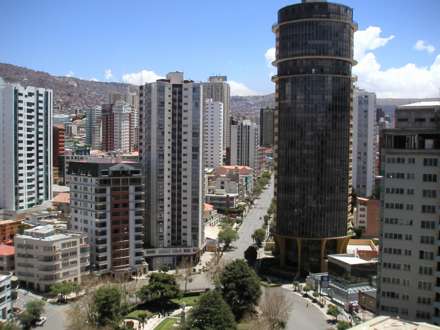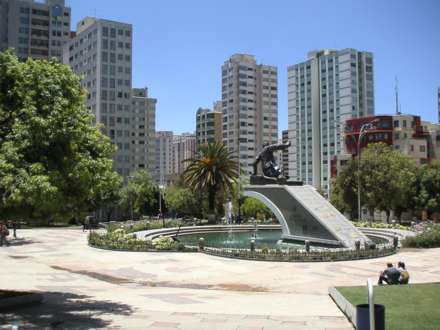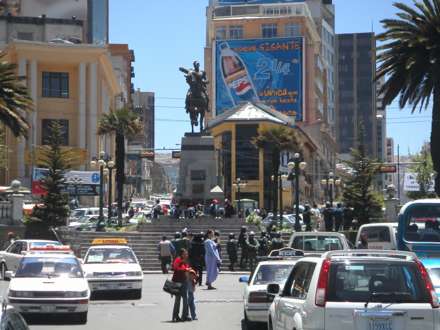Another country (hot & green)
10.31.2003Santa Cruz is really another country. You notice it the moment you reach its territory. Outside the bus, the scenery changed drastically from yellow & grey mountain dessert views, to lush green rolling hills & celeste skies. While the Altiplano is vaguely depresing (sure, it has that sad, emo beauty), the sierras of Santa Cruz are eternal springtime.
Continue reading "Another country (hot & green)"Gone on holiday, back soon
10.29.2003I leave by bus for Santa Cruz in two hours (cost: 100 Bs). I'll try to check in on my internet while I'm there, but I might be too busy running around. But I'll take tons of pictures. And I'm gonna eat so many delicious things ... That's what I most look forward to. Plus, I'm tired of cold, soggy weather.
OK. A flash thunderstorm just hit La Paz. So I'm hunkering in at the cyber café, hoping it passes soon. Did I mention that I'm tired of cold, soggy weather?
Posted by Miguel at 03:54 PM | Permalink
Wish I was there
10.28.2003One of my oldest & dearest friends, Corine, married recently. I missed her wedding, since I was in Bolivia (not Chicago). But thanks to the magic of internet, I get to see online pictures.
I met Corine as a freshman at Central Michigan University. I had an instant crush on her, and we became best of friends. We never dated, though many people assume we did. But we did everything together. Even fronted two bands together (if anyone in the world even remembers the short-lived Morgan) and shared two apartments. She made living in Mount Pleasant fun. Oh, and she's the best wingman ever.
Posted by Miguel at 09:07 PM | Permalink
Say no to bloqueos
10.28.2003The surreal happened today. Students from the UPEA (Public Univeristy of El Alto) marched down the Prado today, protesting whatever it is they're protesting. To be honest, no one seems to understand. It seems they're unhappy w/ who their rector (university president) is and want the government to do something about it. They've been protesting for weeks, and jumped on the "el gas no se vende!" bandwagon.
Continue reading "Say no to bloqueos"Slow weekend
10.27.2003Despite going out a lot, this was a rather slow weekend. On Friday, I went out for spectacular sushi at Wagamama. We were an motley group, including a Canadian, an Andalusian, two Paceños, a gringo, and myself. But we passed the evening enjoying warm sake, octopuss, and various sushi platters.
Continue reading "Slow weekend"Oh, Chapare
10.24.2003Mail arrived today! That's always a great feeling, standing up on the stool, peeking into my mail box, and seeing the snatch of paper that tells me I've a package waiting for me.
The news is starting to slow down a bit. Mesa's honeymoon's now in earnest, though different groups still press their demands. Now that almost all nine prefects resigned (prefects are like governors, but presidentially appointed), each of the nine departments are insisting that they, not the president, choose their successors. This coincides w/ the general push towards more regional autonomy, especially in Santa Cruz, Beni, Tarija, Cochabamba, and Sucre.
Also, there was a bit of a scuffle in parliament today. A group of campesinos (farmers) from the Chapare presented official complaints that they'd been forced, by physical threats, to block roads during last weeks' protests. They accused members of Evo's MAS, and presented photograph evidence of campesions beaten by MAS dirigentes. An agitated Filemon Escobar, a MAS congressman, challenged the accusers to a fist fight. After calming down, he accused the campesinos of being US agents. MAS (Movement Towards Socialism) is the political party that represents the Chapare's coca growers.
In other Chapare news: Land mines & booby traps set by cocaleros killed one soldier and wounded six others in the Chapare. The soldiers were clearing illegal coca fields.
Now the UPEA
10.23.2003Avenida Arce was closed down this afternoon, after more than a hundred students and faculty from the UPEA (Public University of El Alto) sat down in front of the Education Ministry to protest that their university's not autonomous. This was one of demands made during the last three weeks' protests.
Continue reading "Now the UPEA"SIART
10.23.2003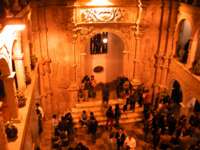 The opening gala for SIART (Salón Internacional de Arte) was crowded. The old colonial interior court was packed w/ artists, public figures, and others. Waiters carrying large trays of complimentary drinks waded through the crowd, instantly assaulted by hands grabing drinks. I saw one particular waiter, trying desperately to deliver a drink across the hall before hands grabbed all the glasses from his tray.
The opening gala for SIART (Salón Internacional de Arte) was crowded. The old colonial interior court was packed w/ artists, public figures, and others. Waiters carrying large trays of complimentary drinks waded through the crowd, instantly assaulted by hands grabing drinks. I saw one particular waiter, trying desperately to deliver a drink across the hall before hands grabbed all the glasses from his tray.
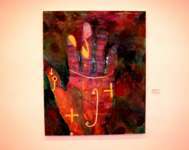 The pieces displayed at the National Museum of Art were quite assorted. Most of the work was two-dimensional, though using different media. I enjoyed most of the oils. There was also a video presentation that was quite interesting; it featured black & white film footage of drunk Alteños wandering the streets in various states of sobriety.
The pieces displayed at the National Museum of Art were quite assorted. Most of the work was two-dimensional, though using different media. I enjoyed most of the oils. There was also a video presentation that was quite interesting; it featured black & white film footage of drunk Alteños wandering the streets in various states of sobriety.
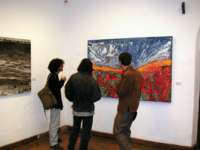 I went to the event w/ Stephen, another Fulbrighter (linguistic anthropologist). He's been here several months longer, and seems to know several members of La Paz's "Bohemian" crowd. After the museum guards started shutting the lights off, we went out to Mongo's for drinks and conversation. I got introduced to some of their projects and whatnot, and was invited to some future tango party. All in all, a pretty good evening.
I went to the event w/ Stephen, another Fulbrighter (linguistic anthropologist). He's been here several months longer, and seems to know several members of La Paz's "Bohemian" crowd. After the museum guards started shutting the lights off, we went out to Mongo's for drinks and conversation. I got introduced to some of their projects and whatnot, and was invited to some future tango party. All in all, a pretty good evening.
Art & books
10.22.2003Today was a rather calm day. I let myself sleep until just before noon, then went down to Alto Irpavi to lunch at my tía Lilia's. The afternoon, I hit a few bookstores and picked up some solid reading material, including a Spanish edition of James Dunkerley's Rebellion in the Veins.
This evening's the start of the Salon Internacional de Arte (SIART), an international, multidsciplinary art exhibit & competition. I plan to attend the opening gala at the Museo Nacional de Arte. SIART's opening was delayed due to last weeks's events.
Tomorrow should be an interesting news day. Mesa's new Minister of Hydrocarbons (Álvaro Ríos) gave his first press conference; he announced that Bolivia's gas "must be exported, obviously." Not sure how this'll sit w/ the Alteño protesters who demanded no gas exports. Or how this fits into the new government's idea of a national referendum on gas (to decide whether it's exported or not). It seems the decision's already been made, which propelled the previous government's downfall.
Back to normality
10.21.2003Things are relatively back to normal. I'm back in my apartment; workers upstairs wake me dutifully at 8am w/ incessant pounding, drilling, and sawing. I picked up my laundry yesterday afternoon and went to the post office to check my mail (nothing in my box).
Continue reading "Back to normality"The City
10.20.2003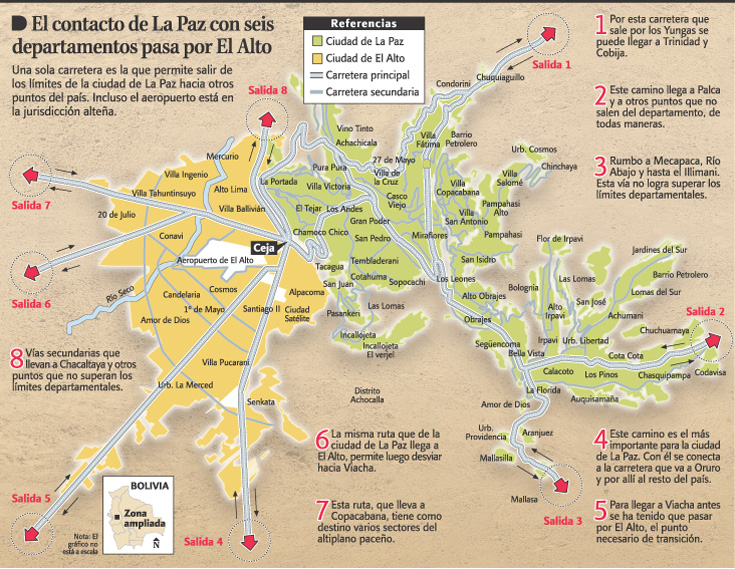 Here's a map of the twin cities of La Paz & El Alto from Sunday's La Rázon. If you wondered about the neighborhood names I reference, this gives a decent idea of what I mean. Click on the map to enlarge it.
Here's a map of the twin cities of La Paz & El Alto from Sunday's La Rázon. If you wondered about the neighborhood names I reference, this gives a decent idea of what I mean. Click on the map to enlarge it.
I live in La Paz (green). Specifically, I live near the Prado (almost the exact center of the map), which is on the main road through the center of the city, just right of San Pedro (near the "o"). Follow the road south, you hit Sopocachi. The capitol and Plaza Murillo is just up from me, just south of the Casco Viejo (the old colonial district).
The Zona Sur's the area past Obrajes. My tía Theresa lives in San Miguel, a sub-neighborhood of Calacoto, close to Los Pinos (where my friend Daniel lives). My tío Juan lives just north of them, in Alto Irpavi. Tía Juana lives south, towards Salida 3, in Aranjuez.
If you're wondering what the map explains: It shows La Paz's vulnerability. W/ 8 highways out of the metro area, the 3 out of La Paz itself, actually go nowhere (at least to no major urban areas). Of the 5 out of El Alto (which can all be closed at the Ceja), only Salida 4 leads to any major cities. Also, keep in mind that La Paz is built in a series of mountain ravines. So the three roads out of the city are the only way out, unless you want to climb some Andean mountains.
-----
UPDATE: I've since moved, and now live in Sopocachi.
A dangerous gambit
10.20.2003While I think Mesa's a solid person, and has the best intentions for Bolivia at heart, I disapprove of the way he came to power. Democratic norms were broken. Essentially, this was a golpe (coup d'état) against the Goni administration. Mesa's administration's already set out to govern in essentially the same way as Goni's, offering the same solutions to the current political crisis (which stems, of course, from effects of the regional/global economic crisis). It's important to note Mesa's new cabinet, while not including members of any political party, increased the number of ministries to 15, has no female members (unless you count the female "special delegate" against corruption, raising the number of posts to 16), and only one indigenous member (w/ no portfolio). Mesa also didn't announce a Minister of Hydrocarbons (apparently, no one wants the post), which makes gas & oil reforms difficult.
Continue reading "A dangerous gambit"Was it worth it?
10.19.2003Here's an excerpt from an editorial in Sunday's La Razón by Augstín Echalar (my translation):
Continue reading "Was it worth it?"Es tranquilo
10.18.2003Today, San Miguel went back to normality. All the shops are open, and everyone's going in & out. Mostly, I think, to cure their cabin fever. The traffic's back to crazy, there's taxis and minibuses in the streets. There's no more soldiers in the streets.
Continue reading "Es tranquilo"Posted by Miguel at 05:19 PM | Permalink
Some personal questions
10.18.2003I've been a week at my tía Theresa's house. I love them, and they're good company. But I wonder when I'll go back to my apartment. On Monday, I walked an hour from downtown to San Miguel, carrying a small duffle bag w/ a few day's changes of clothes. Is my apartment still there? How much of the downtown was looted, burned, destroyed by rioting?
I dropped off my laundry at a service on Saturday. I was to pick it up Monday afternoon. Are my clothes still there? Is the laundry service still there? When can I pick up my clothes?
I've seen none of my friends since Monday. Daniel lives only 2-3 kms away in Los Pinos. But there's little gasoline in the city, and traveling "long distances" is risky. He's stranded at home w/ his wife and 9-month-old daughter. Stephen & Maria are stuck in Sopocachi. Other friends are equally stranded in their neighborhoods. My life the past days is a four block diameter.
I wonder when I'll check my regular mail again. The post office was closed Monday. I'm expecting at least two packages. Not that it matters. My PO Box (there's no home delivery in Bolivia) is downtown and I'm stranded in San Miguel. But I have to send out credit card payments in two weeks. Will the post office open by then?
And how do I get back to work on research for my dissertation. Heck, I wonder what to do about my dissertation after all this chaos.
I haven't been able to visit my grandparents and other relatives/friends in Santa Cruz. When can I travel there? And will it still be part of Bolivia?
When do I get my passport back. I dropped it off at Immigration along w/ other papers while they approved my temporary residency visa. Is my passport still there? When can I get it back? What if I have to suddenly flee the country?
What'll I do if the US embassy decides to evacuate its citizens (they're preparing contingencies). Should I stay and stick it out? If I get evacuated, can I gather my belongings first?
Good luck, Mesa
10.17.2003Goni resigned. Actually, he sent his resignation to parliament, which then had to vote to accept or reject the resignation. The parliament met, under rather raucous circumstances. Parliamentarians who voted to reject the resignation, were shouted down and threatened by members of MAS and MIP.
Continue reading "Good luck, Mesa"If Goni resigns
10.17.2003All the media now take the president's resignation for granted, stemming from a noon press conference by Jaime Paz Zamora (hed of MIR, a government coalition member) that hinted at it.
The parliament's meeting shortly. The president'll speak to the parliament, most likely to resign and hand power over to his vice president, Carlos Mesa Gisbert. A kew coalition ally, NFR, has now officially left the government (perhaps even permanently this time). At the parliament's meeting, each member (there's a total of 157) will speak. So the meeting'll take a long time. But. By this evening, Goni'll make an announcement to parliament (perhaps as late as midnight).
It's likely Goni resigns as president. I don't think it's the right thing to do, in the long term. But it's probably the only solution in the short term. The opposition's unwilling to negotiate on any points (they say they're no longer interested in those "issues"); they only want the president's resignation. Ironically, Evo Morales gave an interview on CNN last night where he was asked about the issue of gas exports; his party championed the slogan that gas would never be exported, it was only for Bolivians. On CNN, Evo stated he's never been opposed to gas exports, it was only a question of "how" to export it.
OK. So Goni resigns. Mesa Gisbert, assumes the presidency and convenes a transitional government. Transitional to what? How'll Mesa govern? How'll changing the person in the presidential seat change the country's economic or social conditions? Besides, Mallku, Evo, and Solares state they won't support Mesa's government, either. So. Will protests and economic paralysis (which is what we're living) continue, regardless?
OK. So there's a transitional government. How will it pass laws? What kind of coalition government will be formed? What kind of chaos will ensue as the new coalition starts to reassign new ministers, vice ministers, ambassadors, etc? What if some of that reassignment's unpopular? What if the new government follows essentially the same policies Goni's government did? After all, Goni's government had never made any decision on exporting gas, so that was never a "real" issue.
OK. So the president resigns in the face of street mobilizations. Does that mean that any time an elected president (in Bolivia or elsewhere) is faced w/ some demand for resignation, the president resigns? So. Are elections meaningless? Is the only deciding factor in national politics the street? What does that mean for democracy? Keep in mind that presidents supported by "the street" (that is, populist presidents) include Hugo Chavez and Alberto Fujimori. Is that what we want? Is the ballot meaningless in the face of organized civic muscle? Have we learned nothing from 1930s Europe?
Before any status quo is altered, a serious consideration of what comes next? is essential. To not consider these questions, to simply say "we'll worry about that later" is to jump blindly into the abyss. It's one thing to criticize a government (a nevertheless essential task in any democracy). But it's another thing to provide a constructive argument of a better one.
A note on gas exports
One of the government's arguments about gas exports is simple: The wells are already dug. Now, we can do three things w/ the gas. One, store it. But there's no infrastructure for that (especially since Bolivia consumes so very little gas, comparatively). It would take years to develop the refineries and other infrastructure necessary. Not to mention that someone'll have to pay for it (w/ what money?). Second, export the surplus to generate national income. We already export to Brazil. But the protests ran under the slogan of "no exports to anyone," which leaves ... Third, burn it. Meaning the gas doesn't get exported to any gringos. Oh, but it also generates no income and is still lost for future use. Which option would you choose?
News briefs
10.17.2003Four people were injured in Santa Cruz, in the Plaza 24 de Septiembre. Marchers from Evo Morales' MAS entered the city to protest the government. At the same time, the Nación Camba and the Unión Juvenil Cruceña, were marching to support the government. The scene turned (briefly) into a street brawl. The country hangs on the edge of civil war.
Continue reading "News briefs"Posted by Miguel at 05:32 PM | Permalink
Some Ironies
10.17.2003Goni gave an interview on CNN wondering why Venezuela's president, Hugo Chavez won't express his support. Venezuela's the only OAS (Organization of American States) member that didn't express his support for Bolivia's president. This is understandable, since Chavez (who's accused of state terrorism) and Evo Morales (leader of MAS) have close ties. It's ironic, however, since Chavez recently defended himself from a similar popular uprising only months ago.
Continue reading "Some Ironies"A war of attrition
10.17.2003Mauricio Antezana, the president's spokesperson, resigned today, citing "personal" reasons. This was a signficant blow to the president, though Antezana was one of the least-liked figures by the protesters. My cousin thinks this helps Goni, since it gives a new face to the press, and eliminates an unpopular person. While he might be right, it's also a symbolic loss to the president.
Continue reading "A war of attrition"Not much news
10.16.2003Not much news this afternoon. There were marches, of course, downtown. The Sona Zur stayed, for the most part, calm. People were out at the now-open cafés and ice cream parlors, riding bikes through the parks, and driving around in their cars.
Continue reading "Not much news"Journalist accused of being Chilean spy
10.16.2003An Argentine journalist was accused of being a Chilean, then of being a government spy. Why? She asked some campesino protesters a few questions, basic questions.
Continue reading "Journalist accused of being Chilean spy"The views in San Miguel
10.16.2003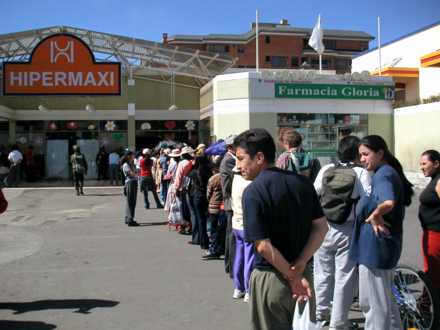
Standing in line to enter the HyperMaxi, yesterday. I waited 30 minutes just to enter, then stood in various lines for an hour inside the grocery store.
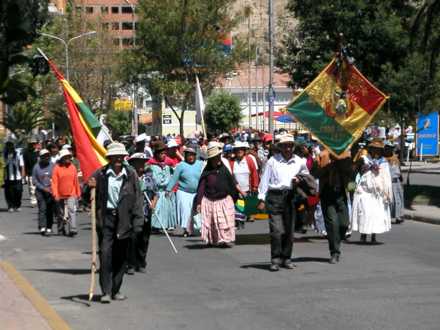
Gremialistas marching down Avenida Ballivian calling for Goni's resignation. People from Zona Sur just watched them walk by. One little old woman confronted them, her finger in people's faces, yelling at them for causing chaos. Other people yelled insults at the protesters.
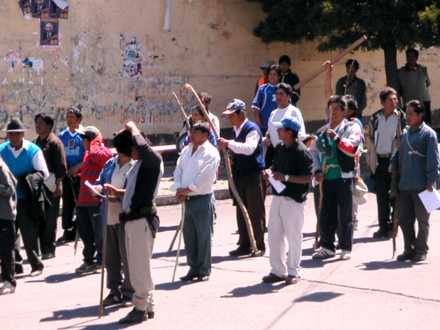
More gremialistas marching down Avenida Ballivian, going in the opposite direction (the first group eventually joined the second, they totalled maybe 500 people). Notice the sticks they brandish.
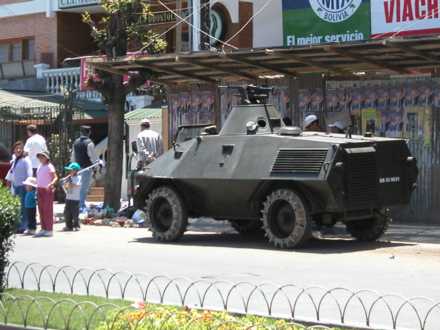
A small tanqueta on the Calle 21 near the Calle Montenegro. Behind it, sat two trucks full of soldiers.
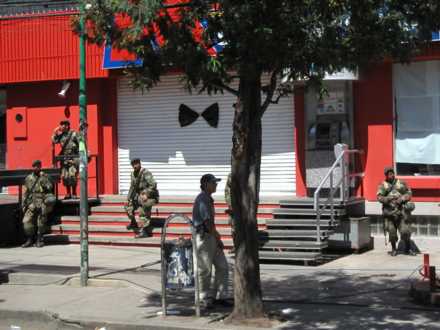
Rangers (elite soldiers) guarding the entry into the Ketal, which was closed at the time (it might reopen this afternoon).
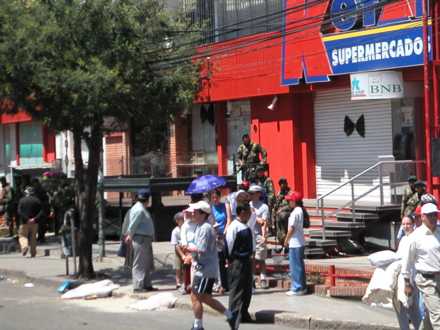
Another view of Ketal and the soldiers, but here you can see vecinos milling about, strolling about as if on promenade.
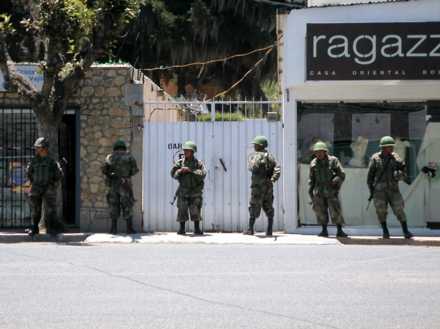
A squad of soldiers on Calle 21 near the corner of Calle Pancara, two blocks from where I'm currently staying.
Brief note
10.16.2003If you read spanish, La Razón published an article explaining the divisions in Bolivian civil society. At the bottom, there's a list of the groups that demand the president's resignation, the groups that simply call for peace, and the groups that've come out in Goni's support. It's quite split, though primarily along regional (East-West) and class lines.
A note of interest, however, is that Evo (MAS) and Solares (COB) don't accept even the resignation of the president anymore. They want the entire parliament as well, w/ power handed over to the Supreme Court.
Posted by Miguel at 11:38 AM | Permalink
Weird normality
10.16.2003I just took a morning stroll through San Miguel and Calacoto. At least one cyber café in San Miguel's open, so's the Punto Entel (which also has internet). Ice cream parlors and cafés are open (at least Dumbo's, Café Alexander, and Café Terraza). There's traffic in the streets, people milling about, and caseras opening to sell things. And there's also a significant military presence on Calle 21, including a small tank (more of an armored assault vehicle, really).
The government's been flying food supplies into the city, and doing what it can to distribute it. Of course, the neighborhoods that are most calm (no protests, certainly none violent) are the easiest places to deliver to. So those of us who're probably least affected by the mob protests, are now even least affected. At most, we're nervously inconvenienced.
The tragedy's that both sides, the syndicate dirigentes and the government both know who're the real losers in this conflict. The rural and (especially) urban poor. The looting in El Alto's nearly destroyed their small market economy; the dirigentes are more and more reverting to intimidation to keep the protesters going. Every day their numbers seem to dwindle. This makes sense, most would rather search for food or other basic necessities for their families (a difficult project since businesses that open their doors in popular neighborhoods are looted, their owners "punished") than protest.
A line of protesters passed down the Avenida Ballivian a few minutes ago. They were fewer than in the past days, though they still carried their signature sticks (often used to beat on windows/doors/walls of open businesses). A half dozen riot police follow them behind, making sure this march stays peaceful.
Goni's given in to all the protester's demands, except his resignation. But he's still not declared a state of siege (which means martial law and a suspension of many civil liberties). I think he's waiting it out, waiting for the protesters to be forced to go home and accept winning all their demands. They're suffering right now, from lack of food and basic necessities. The people in the Zona Sur, for the most part, are enjoying days off from work, ice cream in the sun, and bike rides through empty streets.
I took pictures, once I get home and download them, I'll post a few here.
Late night news
10.16.2003I'm about to log off and go to bed. But the late late night news bulletings are disturbing (and this from a news station highly critical of Goni's presidency, it's called for his resignation). In Bolivia, news shows are also audience call-in shows. Several people just called in to complain that people in their neighborhoods who didn't go out and march or block roads, or who're accused of ever supporting an "officialist" party, are being beaten by MAS protesters. Apparently, the right to dissent only counts if you do it toeing the line set forth by the syndicate's dirigentes.
This point must not be ignored: Much (though not all) of the Bolivian protests are not democratic social movements; they are authoritarian, sectarian opponents of the current government, and a danger to the democratic institutions themselves.
Analysis
10.16.2003Goni still hasn't resigned as president. And I'm not convinced it would be the best thing to do. Sure, it might (and I'm not sure it would) end the protests and return Bolivia back to normal. Any continued government would have very dubious legitimacy and would face a rocky four years to come.
Continue reading "Analysis"Goni speaks
10.15.2003Finally, just before 9:30pm, the president and the heads of the two major coalition parties (MIR and NFR) gave a brief press conference. They proclaimed themselves as the Government of Responsibility and Change. After their meetings, they produced a brief document w/ four major points, meant to address popular demands.
Continue reading "Goni speaks"The news tonight
10.15.2003The president was supposed to speak at 8pm. It seems likely he might step down. Or he could instead call for a state of siege, and start a real military crack down. But no word yet; he's still conferencing w/ leaders of the government coalition parties.
In the meantime, news images poured across the different channels.
In Cochabamba, the conflict seems to've worsened. Protesters assaulted the prefecture (the state capitol), attempting to set it on fire. The threw molotov cocktails, dynamite, and used fire arms. Several university students were arrested, armed, even w/ ammunition for FAL rifles.
The ex-Defensora del Pueblo, Ana Maria Romero, is leading a hunger strike by intellectuals that call for the president's resignation. The group includes Sacha Lloreti, the head of the Permanent Assembly for Human Rights (ADPH) and Samuel Doria Medina (the richest man in Bolivia).
La Paz protests seem to've turned more pacific, calling for an end to the violence, as well as the president's resignation.
Images of indigenos w/ rifles, posing for pictures, calling for civil war most likely sends chills down the spine of the mestizo middle class.
Jaime Solares, head of the Bolivian Worker's Federation (COB) has ordered (that's the word he used) the nation's women to go on hunger strike to demand the president's resignation. Meanwhile, the First Lady asked the nation's women to join together to pray for peace.
Some TV stations admit to having received anonymous threats, including threatening to blow up a TV station. Contrary to rumors, the media announced that it was not under government censorship, and continued working as normal. The government, of course, announced that it wants news reporters to do their work as they see fit. However, TV images just flashed, showing protesters throwing rocks at news reporters, shouting to detain them.
Santa Cruz taxi and bus drivers announced they would violate the order from the COB to go on strike. Traffic continues as normal in the country's largest city. The city's health workers, however, are going on strike.
A communiqué from Beni's Comite Civico was just released coming in defense of the president and constitutional democracy. This makes four (of nine) departments coming formally to the president's defense. The others are Santa Cruz, Tarija, and Cochabamba (despite protests in that city).
Ironically, a commercial just announced that October is Tourism Month in Bolivia. Of course, Bolivia's tourist industry is now at all time low, not likely to recover any time soon.
Cocaine politics
10.15.2003Goni (the nickname for Bolivia's president) announced who he thinks is supporting Evo Morales' alleged coup. He blames Colombia's FARC, a leftist guerrilla movment.
Continue reading "Cocaine politics"Grocery shopping
10.15.2003Just got back from grocery shopping. We heard that Ketal (a supermarket) on Calle 17 was open. By the time I got there, they were no longer letting anyone in; they were closed. I walked up a block to HyperMaxi, which was still open. Stood in line for over a half hour, before the military let me in. I bought as much basic food as I could for my relatives.
Continue reading "Grocery shopping"Posted by Miguel at 04:59 PM | Permalink
Drawn out tension
10.15.2003Things are still extremely tense here in Bolivia. I'm gonna go out to the Calle 21 of San Miguel in a bit and see what I can see; I'll bring my camera along. But TV news is streaming in. I can't blog often, since I've got to leave the phone line open. Just in case.
Protests continue in Cochabamba. There was a small MAS (Evo Morales' party) march in Santa Cruz, w/ threats of looting. But then it was escorted by the military, so it turned out safe enough. Still, most of the mercados in Santa Cruz closed down.
A group of miners confronted the military about a 100 kilometers from La Paz. The miners can be dangerous, since they bring dynamite and more than willing to use it. A few days ago, a miner was killed when he accidentally set off his dynamite; the government agreed to pay an idemnity for him and those injured around him.
The tourist industry's taking a huge hit. So's the business sector. Cochabamba alone estimates a loss of $1 million per day; they worry that they'll have to start laying off workers to cover the cost.
In the end, the loser of all this tragedy is the Bolivian people. Food is running out in the city; many families are having a hard time finding food. First, because most markets in La Paz and El Alto are closed (if they open, protesters will sack them and beat the owners for being "unpatriotic"). Second, because weeks of highway protests have taken their toll, little foodstuff has come into the metropolitan area in days.
The saddest thing's that this will only affect the poor, not the rich. At worst, people in the Sona Zur are going w/o their café or ice cream (although we still went out for ice cream in San Miguel last night). We have plenty of food; we're essentially safe w/ our well-stocked fridges. But the people in El Alto, who live day-to-day, are suffering from the protests. The pressure's all on them, not on the sureños.
The longer the protests go, the worse the economy gets. And the more the poor suffer. If it goes on long enough, the government might be cheered, not condemned, when it cracks down. Perhaps Goni's waiting for that moment?
Night watch
10.15.2003Went out last night to take a turn w/ the neighborhood watch. After a brief meeting, we were told to wear a white sash around our right arm and given instructions for different contingencies.
Mostly, we just walked around San Miguel, or gathered together to drink coffee. It was a quiet night. We did unblock the Avenida Costanera, brushing aside stones and a giant tree.
But I did get a good chance to talk to several people about the events. Most of the neighbors here understand the frustrations of the people from El Alto and the campesinos. But they also support using democratic means to affect change, not violence.
La Paz is still tense, while the protests are gaining steam in Cochabamba. Things are still quiet in Santa Cruz.
The spark that lit the fire
10.14.2003The question of how exactly this current crisis in Bolivia got started is, of course, complex. There are many social problems in Bolivia. It's a third world country, after all.
And protests are frequent, and often confusing. Different protest groups tend to join each other w/o any reason other than to increase each other's numbers. For example: the students from the Universidad Mayor de San Andres (UMSA) marched this week asking for an asesor, an advisor to the social science faculty.
And sometimes w/o logic. This week a series of marches started ... in protest of marches.
But, the question is, where did this current crisis that threatened (I'm not sure it still does) to overthrow the constitutional democracy begin? Well, it actually began in July.
On 27 July, a dirigente (Edwin Huampo) allied w/ Felipe Quispe (aka Mallku) arrested a cattle thief. The cattle thief was beaten. To death. Since capital punishment is illegal in Bolivia, the dirigente was arrested to stand trial for murder.
Mallku started a bloqueo (a highway blockade) in the Altiplano late September, demanding the immediate release of their dirigente. The government refused to release Huampo, since he was standing trial for murder (he was eventually released, though this still didn't appease the campesinos). Of course, this bloqueo ended in the horrible events of Warisata, where military & police tried to rescue 1,000 hostages and were ambushed by armed campesinos.
In the meantime, Evo Morales took the opportunity to also claim responsibility for the bloqueos, naming them in behalf of the opposition of exporting gas through Chile (a decision that the government had never made, as it continuously stated). As is typical in Bolivia, the various social marches (such as the protest of pensioners and university students) joined under the easy slogan of: "El gas no se vende!"
From there, everything gained momentum. Each time the government said it was willing to negotiate, Evo and Mallku added new demands or just plain said "No!"
The basic problem of protesting in this country is that it's not fully understood by the protesters themselves. Protest is an essential part of democratic life; everyone has a right to protest. But that right can't violate the right of other people to not protest.
In Bolivia, that's not the case. The syndicatos are very heavy handed. When people march in protest, they demand that businesses close. If they don't, they will close them, by force. And they defend their violent vandalism (which is what it is) by saying that it's their "right" to effect a protest against the government.
The TV shows images of caseras who are beaten if they dare to open their shops. The gremialistas have threatened to kerosene (set on fire) caseras who refuse to show their "solidarity" w/ the marchers. This is the nature of protests in Bolivia. They're not democratic; they're based on authoritarian, patronalist practices. And the saddest reality's that those most affected and damaged by these "protests" are the poorest of Bolivians, who live day to day from their life selling things in street markets or as taxi drivers.
Still, today things seemed calm. I think the worst is over. More than 19 countries sent official messages stating that they would not recognize any solution that violated the constitution or democratic institutions. Many, in Europe & Latin America, have blamed Evo and other dirigentes for the violence and for, essentially, attempting to overthrow the democratic institutions.
Ironically, by waitiing several weeks, Goni (the president) is now stronger than he was at the beginning at the start of the conflict. Most of the so-called "systemic" parties (those who support democracy) realize that Evo, Mallku, and Solares reject the entire democratic system (they currently call not only for the president to step down, but also the dissolution of parliament and other institutions).
The Next Day
10.14.2003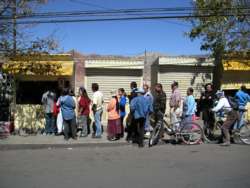 I couldn't buy bread today. I stood in line in San Miguel, but the casera ran out several people before me. Things are still tense, but eerily calm.
I couldn't buy bread today. I stood in line in San Miguel, but the casera ran out several people before me. Things are still tense, but eerily calm.
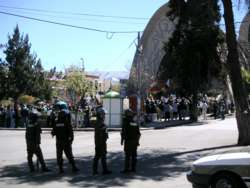 A group of protesters had taken San Miguel parish, chanting their slogans. This is a strategy to make it seem as if the people of the Sona Zur also demand Goni's removal. Of course, the protesters came down from El Alto; they're not vecinos of the Zona Sur.
A group of protesters had taken San Miguel parish, chanting their slogans. This is a strategy to make it seem as if the people of the Sona Zur also demand Goni's removal. Of course, the protesters came down from El Alto; they're not vecinos of the Zona Sur.
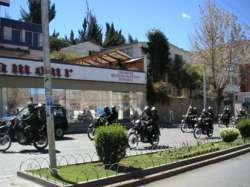 And then the surreal happened. A line of motorcycle police in riot gear rode down Calle 21. And the vecinos cheered. And clapped. Someone shouted: "Denles balas!" It was surreal. Fortunately, the crowd was dispersed w/o even using tear gas. W/in minutes, the protesters were gone.
And then the surreal happened. A line of motorcycle police in riot gear rode down Calle 21. And the vecinos cheered. And clapped. Someone shouted: "Denles balas!" It was surreal. Fortunately, the crowd was dispersed w/o even using tear gas. W/in minutes, the protesters were gone.
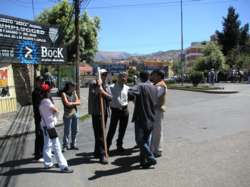 I think Goni's won. Incredible as it seems. The international community has stood behind him and his presidency. Not so much for support of him personally, but rather to support the democratic institutions. The international pronouncements against Evo and the other dirigentes blaming them for using violence to try to affect a coup. The other political parties are also now solidly lining up behind the government and the constitution. That gives Goni a green light to end this.
I think Goni's won. Incredible as it seems. The international community has stood behind him and his presidency. Not so much for support of him personally, but rather to support the democratic institutions. The international pronouncements against Evo and the other dirigentes blaming them for using violence to try to affect a coup. The other political parties are also now solidly lining up behind the government and the constitution. That gives Goni a green light to end this.
In the meantime, neighborhood vigilance committees patrol the streets around Zona Sur.
Continue reading "The Next Day"Who knows what tomorrow brings
10.13.2003I'm safe. I spent the afternoon w/ two friends in an upstairs apartment near the Plaza Isabel la Catolica. From there, we listened to the radio news. And we saw the smoke, rising from the Prado, from the Plaza Murillo, from El Alto. There was looting and fires. Much of the Sagarnaga was burned. And the mob came as far down as San Miguel.
Continue reading "Who knows what tomorrow brings"Silence (before the storm?)
10.13.2003Everything on the Prado's closed. I had to walk to Sopocachi to buy a newspaper. Few were printed today, I was lucky to find a vender who had La Jornada.
There's at least 25 dead and 100 wounded in El Alto from what's being called "Black Sunday." The military was able to escort 14 tanker trucks w/ gasoline into the city, but it's not enough to bring transportation to even a shade of normality. Pedestrians rule the street, most heading south away from downtown as business after business closes its doors. Even the post office is closed, perhaps until Wednesday.
The president gave a talk last night, an executive decree, that no gas would be sold to any new markets until popular debates are held. This was (supposedly) the key demand of the various protesters. Everyone's waiting to see if it'll be enough to start negotations between the COB (and other syndicates) and the government. So far Goni hasn't declared a state of siege, and I think this is a good thing. The ball is in the COB's court.
There are rumors of a coup d'état ... I don't think this'll happen. I pray it doesn't happen.
From bad to worse
10.12.2003I'm online, listening to the radio. There are many dead & wounded in El Alto after clashes w/ the police & army. The woman on the radio complains that ambulances have a hard time getting to the wounded.
Continue reading "From bad to worse"Under siege
10.11.2003So this is what a siege feels like. For weeks, La Paz was under siege. The roads out of the capital were blocked (all five of them); there was no way out by land (keep in mind the city's inside a series of mountain ravines). But no one seemed to care.
Continue reading "Under siege"Posted by Miguel at 12:35 PM | Permalink
Brief updates
10.09.2003OK, sorry I haven't posted any pictures yet. I just got a floppy disk, so I can do that again. There's a reason for few pictures, though. I feel too "touristy" wandering around w/ my digital camera. Plus I'm usually more free at night, and you know digital cameras and night photography. But I'll try to take more pictures. I've already got a good series of some of my favorite plazas.
My couch still hasn't been delivered. I'm a bit miffed about that. I'm going up to Eloy Salmón (a shopping district/street) to find out what's going on. While I'm there, I'm gonna buy a fridge and install it in my apartment.
Also, I may be going into business w/ my friend Daniel. It's very preliminary as of now, but it involves crêpes and coffee. But it doesn't mean I'll move to Bolivia for good.
Finally, my brother Sam is coming to visit on 16 December! I'm sure we'll have a great time. I'm already counting down the days.
I ♥ Mercado Camacho
10.06.2003I just had the best burger in a long, long time. Perhaps ever. There's a burger stand just alongside the entrance to the Mercado Camacho. For 3 Bs. you get a delicious burger and a side of fries. You stand alongside the stand's counter, eating your burger shoulder to shouder w/ all types. The aroma of lean, ground beef and ají (hot sauce) wafts over while you eat. Yum.
Then I walk over to my fresh fruit juice seller. I have fresh chirimoya & milk, bleded together. Only 2 Bs. Wow. Too delicious for words. Tomorrow I think I'll try strawberries, or maybe mango.
Then I go down to visit my casera for some household cleaning supplies. She greets me w/ a "¿Cómo está, patroncito?" and we chit chat about the little things I need. I get most of them from her, except a sink stopper, which she didn't have. She'll bring me one tomorrow.
I'm glad I finally have a casera. That relationship's very important. This is how most people shop in Bolivia. They go to "their" market and visit "their" caserita, who treats them well and gives them good prices. Even shopping depends on social relationships.
I've also decided that I'm going to buy a fridge. I don't need to cook, but I'd like to have milk for cereal, vegetables for fresh salads, and cold cuts & cheese for sandwiches. This means, of course, that I'll have to find another casera for my meat & dairy products, since my current casera only sells dry goods and cleaning supplies. But that's OK; the Mercado Camacho is pretty large, actually.
Scary? Not sure
10.06.2003The protests that were losing steam at the end of last week, are back in full swing. Thousands are marching towards the Zona Sur (the middle class residential neighborhoods). I'm watching and listening to them in the street below as they march down Avenida 6 de Agosto.
Continue reading "Scary? Not sure"Busy, not busy
10.05.2003This weekend I spent mostly w/ family. Alvarito had his first communion, so all the family descended on the Catedral Castrense, then for a brief fête at his house w/ salteñas & ice cream cake, then off to an impromptu parrillada (a BBQ) at tía Theresa's, where we devoured six kilos of beef.
Continue reading "Busy, not busy"Mercado Camacho & other adventures
10.03.2003I'm starting to explore the mysteries of the Mercado Camacho, an open market two blocks from my apartment. It's more substantive than I'd thought (not being a "major" city market). But I think I've found my fresh juice stand (there's three or four) where I can get almost any juice w/ water (or milk) for Bs.2. Inside, there's every imaginable vegetable, fruit, meat, dairy, or whatever else I might want. Outside, along Camacho street, are half a dozen comedores that serve lunch for Bs.6.
Continue reading "Mercado Camacho & other adventures"All official & a night on the town
10.02.2003Yesterday afternoon, I went to the US embassy for my "security briefing", after which I got my very official embassy badge. I can just waive it at the guards and walk right into the embassy. It actually seems rather silly.
Continue reading "All official & a night on the town"Contrasts & a note on graft
10.01.2003The Prado was blocked again today. This time, however, by a procession celebrating Women's Day & Literacy Day. Groups of women in ethnic costume danced by the Prado streets, while brass bands played carnaval tunes (I'll post a picture soon). A marked contrast from the COB marchers on the other side of the boulevard.
Also, I'm finally close to finishing my residency registry (registro domiciliario) w/ the PTJ (Technical Judiciary Police). It's taken me eight trips to and from their headquarters, each time to get another form or another photocopy. In the end, I needed: photocopies of my passport (including the page of my last entry into the country), a letter from my renter & photocopies of her ID, signed affidavits from two witnesses & photocopies of their IDs to the affect that I live where I say I live, photocopies of the deed, the electric bill, the phone bill, a letter written & stamped by a lawyer officially requesting recognition of my residency status, and a form (cost Bs.13).
I finally got all the paperwork in order. I need this paperwork in order to then start my paperwork for my residency visa through the US embassy. I was sent in to see a certain sargeant, who's job it was to verify my residency. He sat in a dank room, surrounded by piles of paperwork. I handed him my papers, he looked them over, asked me a few questions. Then, he stated that he'd have to go and verify my residency.
"Sure, go ahead" I told him.
Then he vaguely asked something about how we'd arrange the transport to and from the apartment. Like, should I pick him up?
I knew where this was going. So I chose to play dumb. "I don't know what this process is like."
He looked perplexed, I was going to force him to spell it out. Apparently, there's a special stamp that needs to be placed on this paper, he's doing me a favor, etc.
"Yes, you can verify my residency any time you want."
Finally, he just said it. "You need to pay for my transportation."
I kept playing along. "Oh, how much is that fee? I don't know what the requirements are."
So here it comes: "It's for you to tell me."
So I took him at his word. "Well, it's never cost me more than Bs.10 (about $1.30) to round trip from here in a taxi."
He didn't look happy w/ this. Mulled it over in his head. "Make it Bs.20."
In the end, he didn't even "require" my presence at my apartment when he comes. I'm sure he won't even bother going. I saw him put the money right into his pocket (and I wasn't going to push my luck by asking for a receipt!). So there you have it, after all my paperwork, it came down to me handing over Bs.20 to a cop to get my residency status squared away. I'm supposed to pick up my forms tomorrow afternoon, after the sargeant has "verified" my residency.
